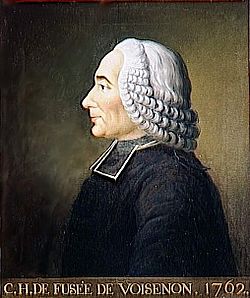
Claude-Henri de Fusée de Voisenon
Encyclopedia

France
The French Republic , The French Republic , The French Republic , (commonly known as France , is a unitary semi-presidential republic in Western Europe with several overseas territories and islands located on other continents and in the Indian, Pacific, and Atlantic oceans. Metropolitan France...
dramatist and writer.
Born at the château de Voisenon, in Voisenon
Voisenon
Voisenon is a commune in the Seine-et-Marne department, in the Île-de-France region in north-central France.Little village, located 39 kilometres south-east from the center of Paris, Voisenon was mainly known for its 12th century abbey, and then for its renowned local figure, Claude-Henri de Fusée...
, near Melun
Melun
Melun is a commune in the Seine-et-Marne department in the Île-de-France region in north-central France. Located in the south-eastern suburbs of Paris, Melun is the capital of the department, as the seat of an arrondissement...
, he was only ten when he addressed an epistle in verse to Voltaire
Voltaire
François-Marie Arouet , better known by the pen name Voltaire , was a French Enlightenment writer, historian and philosopher famous for his wit and for his advocacy of civil liberties, including freedom of religion, free trade and separation of church and state...
, who asked the boy to visit him. They remained friends for fifty years. Voisenon made his début as a dramatist with L'Heureuse resemblance in 1728, followed in 1739 by a three-act comedy L'Ecole du monde at the Théâtre Français. This was preceded by a verse prologue, L'Ombre de Molière
Molière
Jean-Baptiste Poquelin, known by his stage name Molière, was a French playwright and actor who is considered to be one of the greatest masters of comedy in Western literature...
, and a month later Voisenon produced a criticism of his own piece in Le Retour de l'ombre de Molière.
A duel
Duel
A duel is an arranged engagement in combat between two individuals, with matched weapons in accordance with agreed-upon rules.Duels in this form were chiefly practised in Early Modern Europe, with precedents in the medieval code of chivalry, and continued into the modern period especially among...
provoked by Voisenon inspired him with remorse, and he entered the priesthood, becoming vicar-general to the Bishop of Boulogne. He received the abbey of Jard, which made no demands on him. He became closely attached to Madame du Châtelet, the mistress of Voltaire, and was intimate with the comte de Caylus and Mademoiselle Quinault Dufresne. He made witty but by no means edifying contributions to the trennes de Saint-Jean, the Bals de Bois, etc.
In 1744 he produced the Ménages assortis and in 1746 his masterpiece, the Coquette fixée. He was a close friend of Charles Simon Favart
Charles Simon Favart
Charles Simon Favart was a French dramatist.Born in Paris, the son of a pastry-cook, he was educated at the college of Louis-le-Grand, and after his father's death he carried on the business for a time...
and his wife. His pen was always at the service of any of his friends, and it was generally supposed that he had a considerable share in Favart's most successful opera
Opera
Opera is an art form in which singers and musicians perform a dramatic work combining text and musical score, usually in a theatrical setting. Opera incorporates many of the elements of spoken theatre, such as acting, scenery, and costumes and sometimes includes dance...
s. Voisenon had scruples all his life about the incongruity between his way of living and his profession, but he continued to write indecent stories for private circulation, and wrote verses in honor of Madame du Barry
Madame du Barry
Jeanne Bécu, comtesse du Barry was the last Maîtresse-en-titre of Louis XV of France and one of the victims of the Reign of Terror during the French Revolution.-Early life:...
, as he had done for Madame de Pompadour
Madame de Pompadour
Jeanne Antoinette Poisson, Marquise de Pompadour, also known as Madame de Pompadour was a member of the French court, and was the official chief mistress of Louis XV from 1745 to her death.-Biography:...
.
He was elected to the Académie Française
Académie française
L'Académie française , also called the French Academy, is the pre-eminent French learned body on matters pertaining to the French language. The Académie was officially established in 1635 by Cardinal Richelieu, the chief minister to King Louis XIII. Suppressed in 1793 during the French Revolution,...
in 1762. On the disgrace of his patron, the duc de Choiseul, he lost his pensions and honours, but soon recovered his position. He was intimate with the chancellor Maupeou, and was suspected of writing on his behalf in defence of the abolition of the parlement
Parlement
Parlements were regional legislative bodies in Ancien Régime France.The political institutions of the Parlement in Ancien Régime France developed out of the previous council of the king, the Conseil du roi or curia regis, and consequently had ancient and customary rights of consultation and...
. This and some other incidents brought him into general disgrace. Early in 1775 he retired to the château de Voisenon, where he died.
His Œuvres complètes were published by his executrix, Madame de Turpin, in 1781.

